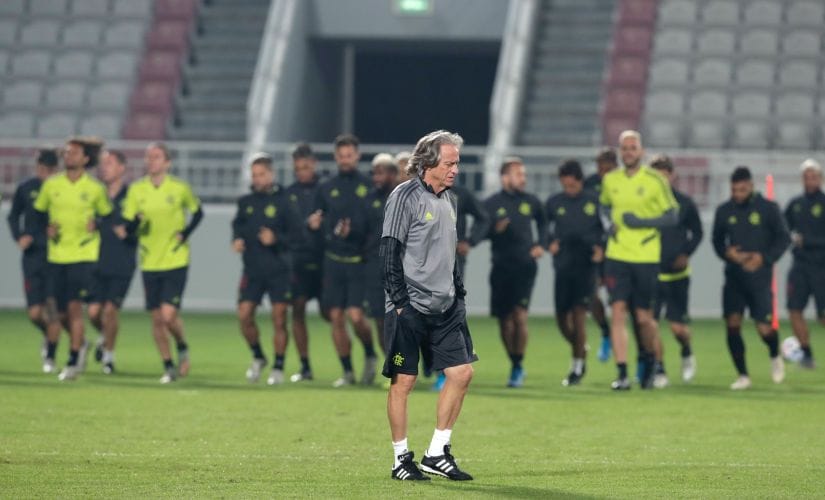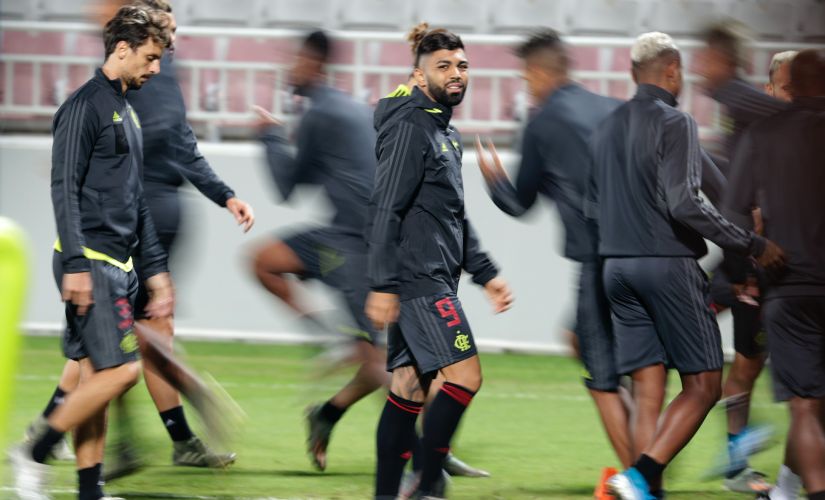Doha: Can Flamengo produce a final act of heroism after a magical 2019 instigated by the Jorge Jesus revolution, who transformed the Rio giant into a swashbuckling, modern side with a penchant for the Homeric? On Saturday, Liverpool await in a final for the world crown that might once more underwrite the fault lines running across the global industry. [caption id=“attachment_7811031” align=“alignnone” width=“825”]  Jorge Jesus managed Flamengo will contest the FIFA Club World Cup final against Liverpool in Doha. AP[/caption] In 1981, Ronald Reagan was sworn in as US president, setting the course for an age of destructive neoliberalism and Microsoft introduced MS Dos. In Tokyo, Flamengo and Zico swept past European champions Liverpool and Kenny Dalglish in the Intercontinental Cup with a brace from Nunes and Adilio before half time. The extraordinary result marks the zenith of Flamengo’s history, a club that enchanted the masses in Brazil by signing the three leading black players of the time Fausto, Leonidas da Silva and Domingos da Guia and the introduction of the ‘Charanga,’ the out-of-tune-band in the stands, a symbol of the masses. Ever since the Tokyo triumph, Flamengo fans have been obsessed with returning to ’81 heights, a landmark achievement stooped in their DNA of front-foot football and braggadocio. This season Jesus has reconnected the club with its history by proposing a game that is both bold and attacking. At a bouncing Maracana, the fans have serenaded the Portuguese and his players repeatedly for the bravura with which they swept past domestic opponents enroute to the Brazilian title. They sang: “In December ’81, you ran circles around the Englishmen, you beat Liverpool 3-0, it left a mark on history, And there is no other like you, Only Flamengo is world champion, Now your people want the world again.” Then they chanted it in Lima after a stirring comeback in the Copa Libertadores final, but the demand from the Flamengo fan base was not to be misunderstood: “we crave and long for victory in the ’81 rematch with Liverpool.” It is the final and most exigent quest yet, and one that will perhaps be telling of Flamengo’s future fortunes and contest the balance of power between Europe, South America and the rest of the world. For South American clubs the tournament offers the annual opportunity to go toe-to-toe with the winners of the Champions League and put one over the glamorous kings of European football, but to have a crack you must reach the final first. Internacional, Atlético Mineiro, Atlético Nacional and River Plate all suffered indignant defeats in the last four in recent tournaments. On Wednesday, Flamengo navigated a difficult encounter with Asian champions Al-Hilal, a team of moderate tactical sophistication and 45-minute physicality, but the renewed struggles against a foreign club - the Copa Libertadores matches with River Plate and Emelec were equally difficult - imply that Flamengo is perhaps nothing more than a domestic force. In that context, the idea of the Rio giant becoming a super club might be untenable. Then, there is the economic reality too. The divide between Europe and the rest is almost insurmountable in economic terms, and as a direct result thereof in quality and skill. That goes for all continents, who not without envy wonder how they can level the playing field with the old continent. [caption id=“attachment_7811021” align=“alignnone” width=“825”]  Flamengo’s Gabriel Barbosa warms up during a training session in Doha, Qatar. AP[/caption] On the back of unprecedented sporting success, financial sanitization followed by investment, the appointment of Jesus and the monetization of its giant 35 million fan base, Flamengo’s revenue will top 200 million euros in 2019, a figure that pales in comparison with Europe’s super clubs - the storied Spanish giants or the nouveau riche backed by Gulf States. The rise of the super clubs has fundamentally reshaped the European football landscape with inequality becoming entrenched and metastasized. In South America, Flamengo have assembled a talented team through a 40 million euros outlay, almost unprecedented on the continent, but to further grow the Rio club requires a stronger ecosystem at home and in continental competitions. The Copa Libertadores is a shadow of the Champions League, the competition that still draws best players from all corner of the globe. In the future, Flamengo can target hegemony in South America, but outside the Americas, economic imperatives and football’s reality are unassailable - at least economically. Rodrigo Caio, Everton Ribeiro and Jorge Jesus have all said said that Flamengo will not alter their philosophy on the pitch against Liverpool. It is a bold if somewhat foolish statement. Flamengo play proactive, attacking football. They don’t defend in numbers, but prefer to dictate the play, fielding a high line. That is where the danger lurks against Liverpool’s high-octane attacking game. Jesus’ problem is that his team have no plan B. They can’t stifle Liverpool the way Monterrey did to reasonable success in the semi-final. Flamengo want to conquer the world crown in the fine style of their predecessors from ’81. It’s audacious and brave - and it might work.
Flamengo want to conquer the world crown in the fine style of their predecessors from ’81. It’s audacious and brave - and it might work.
Advertisement
End of Article


)

)
)
)
)
)
)
)
)



